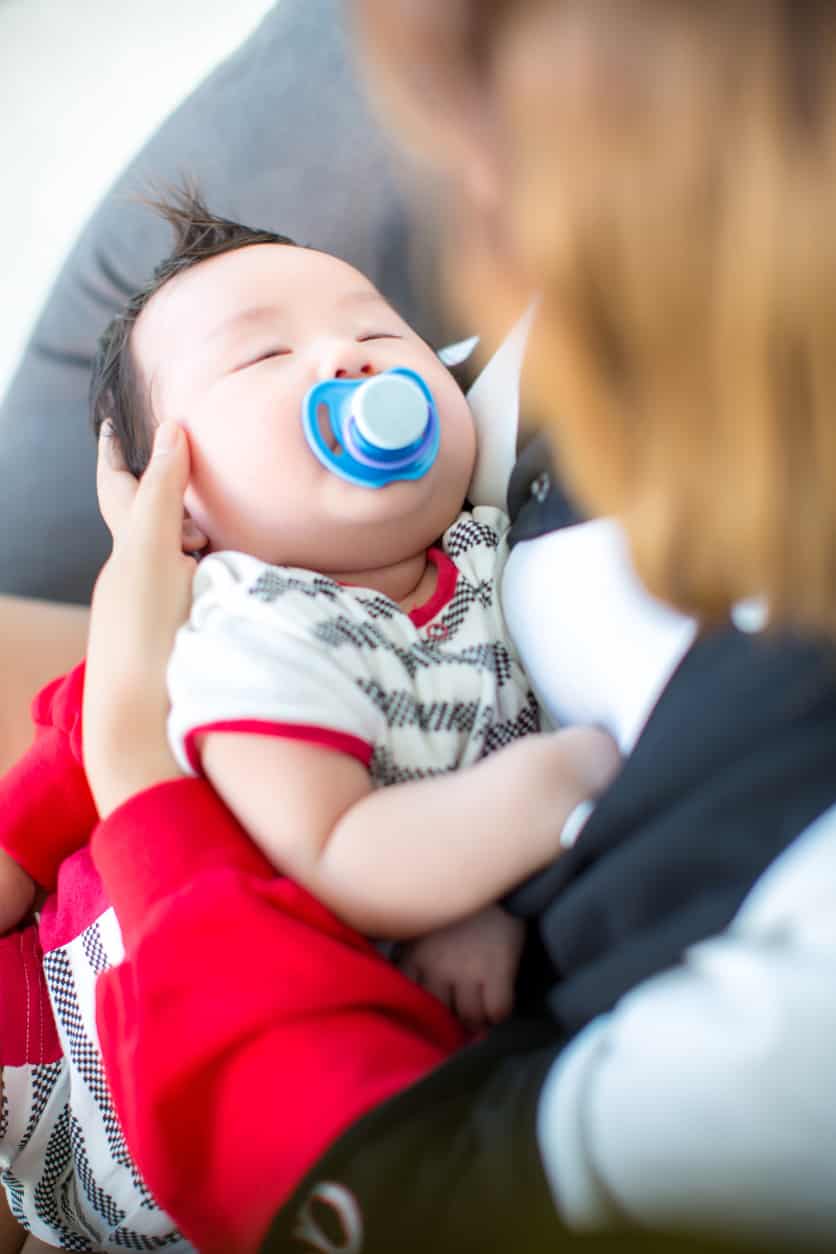Babies have an instinctive need to suck, and parents often turn to pacifiers to comfort their little one in the absence of a breast or bottle. But is pacifier use okay when a baby is sleeping? Should you remove it when your little one dozes off? The answer is no — you don't need to remove a pacifier when your baby is sleeping. Pacifier use can be beneficial, not just when babies are awake but also when they're asleep.
Key Points of Pacifiers and Sleeping Babies
- If your baby falls asleep with a pacifier in their mouth, it's generally safe to leave it in.
- A pacifier is useful in the first few years of life for self-soothing but most doctors recommend that you end the practice to maintain healthy sleep cycles.
- If your child falls asleep with a pacifier in their mouth, make sure there are no choking or breathing hazards with that specific pacifier.
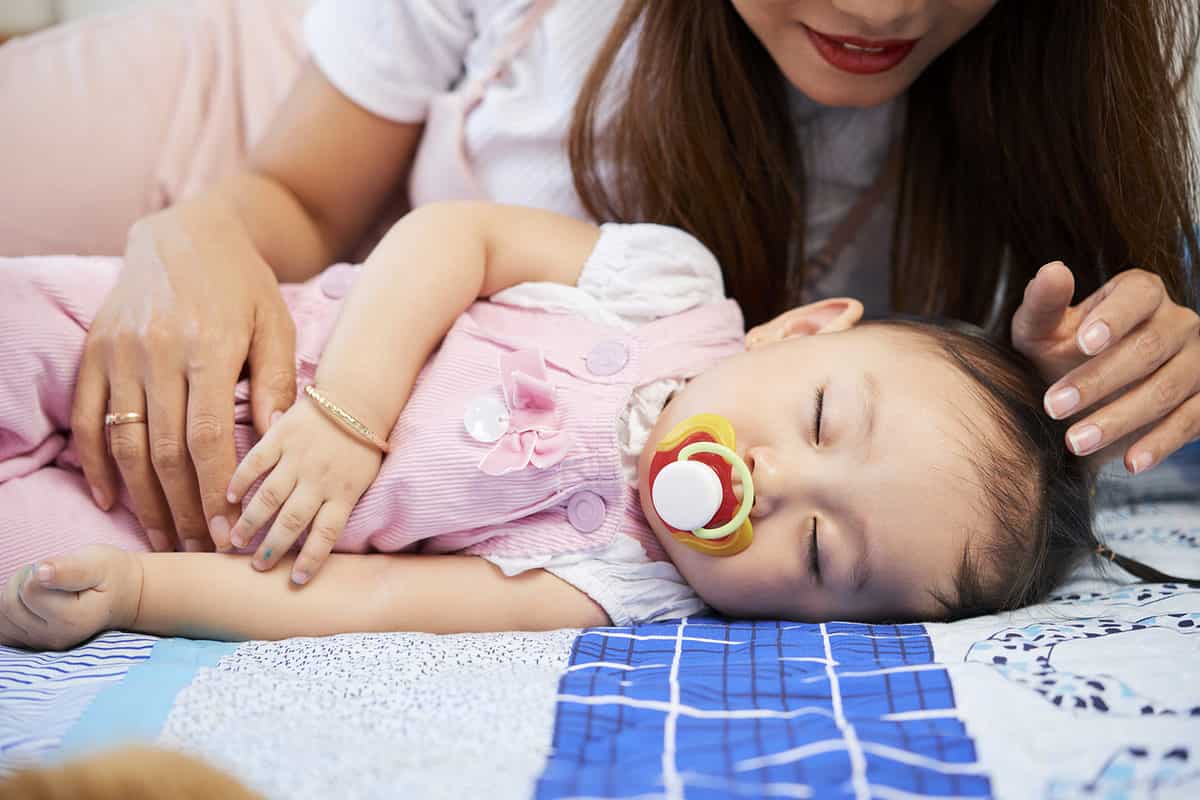
©iStock.com/DragonImages
Should I Remove the Pacifier When Baby Is Sleeping?
No, you shouldn't. Removing a pacifier while a baby is sleeping can disrupt their sleep cycle. It can take time for them to adjust to being without the pacifier, and they may start waking up more frequently.
Removing the pacifier too soon can also affect teething, as the process of a baby's teeth coming in can be greatly soothed by using a pacifier. If they are teething heavily, you can chill not freeze their pacifier for added relief.
However, avoid re-inserting it in the baby's mouth once it falls off. Not only is it an unwise idea to wake up a sleeping baby. But this could interrupt their sleeping schedule and make it harder for them to self-soothe.
How Long Should a Baby Sleep With a Pacifier?
Most experts recommend limiting pacifier use to the first few years of life. Pacifiers may help babies self-soothe and fall asleep, but it is essential to avoid overuse as it can disrupt healthy sleep habits. It is also vital for you to make sure that the pacifier does not pose any risks, such as choking or suffocation.
It is best to limit pacifier use at night when babies are the most likely to need help falling asleep and remove it by the time they are 3 years old. Since pacifiers can also be comforting for some babies during naps, you should monitor your child’s sleep habits and adjust accordingly if needed.
Ultimately, the amount of time a baby can sleep with a pacifier is up to you. Still, it is essential to follow age-appropriate guidelines and remove the pacifier when necessary.
Overall, a pacifier during naps and nighttime can help babies fall asleep more quickly, but it should be used in moderation and monitored for safety.
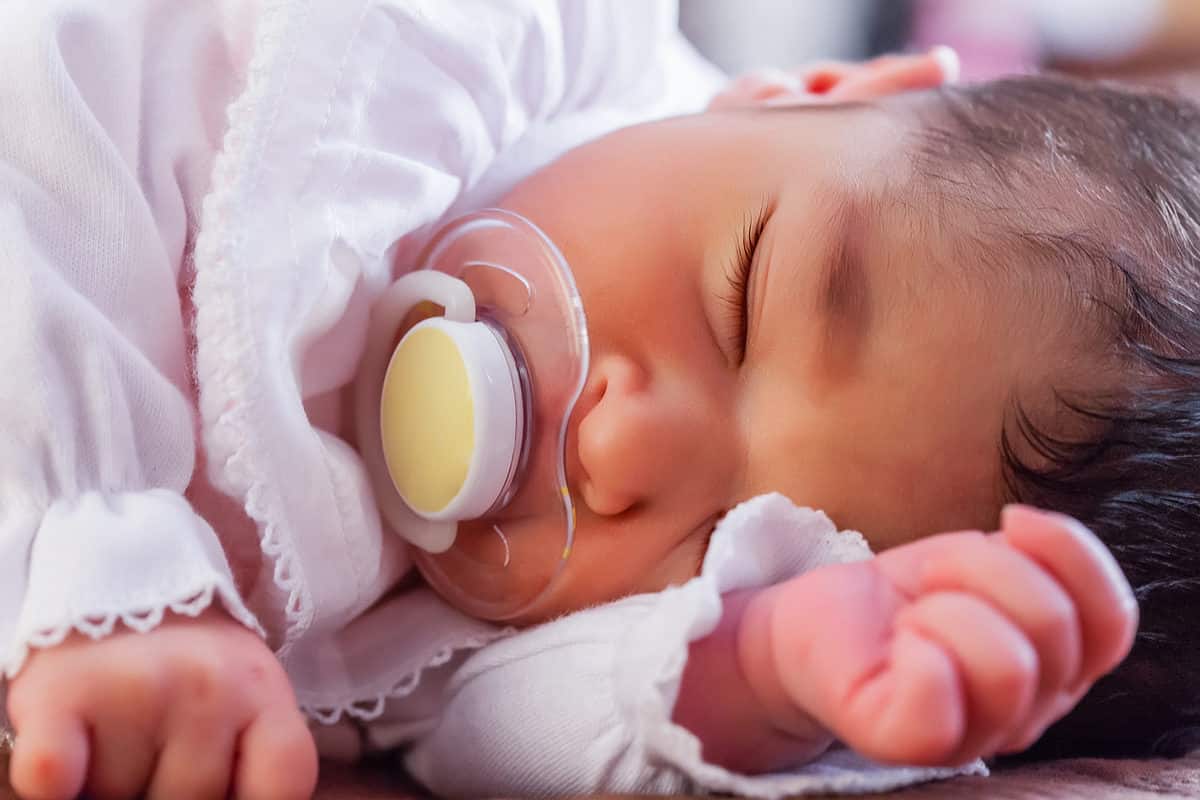
©iStock.com/StockPhotosArt
How To Teach My Baby To Self-Soothe Without a Pacifier
If you are trying to teach your baby to self-soothe without using a pacifier, some simple strategies can help.
- Create a safe and comfortable space for your baby to feel secure. Ensure your baby's room is dark and quiet with minimal distractions so your little one can fall asleep without interruption. Consider providing white noise to help drown out any outside noises that may distract your baby from settling down and drifting off to sleep.
- Establish a bedtime routine with your baby that includes calming activities such as rocking, singing, or reading a book together. Doing something soothing before bed can help your baby relax and get in the right mindset for sleep.
- Provide your baby with a security object they can use to self-soothe. This could be something like a soft blanket, stuffed animal, or special toy your baby can cuddle up with when going to sleep.
- Don't give up if it takes time for your baby to learn how to self-soothe without a pacifier. Be patient and consistent with your approach; eventually, your little one will find comfort in their ability to relax and drift off peacefully.
Does a Pacifier Help Baby With Gas?
The answer is yes! Pacifiers can help babies with gas, as they are a comfort item. Babies may find it soothing to suck on a pacifier while experiencing discomfort from gas. Additionally, pacifiers also help many babies learn how to self-soothe and relax, which in turn helps reduce the severity of their distress.
However, note that each baby is unique; some may find pacifiers ineffective or uncomfortable. If you notice that your baby does not take to the pacifier well or appears more agitated with it than without, you should try other soothing methods such as rocking, singing, or gentle massage.
Eventually, every baby will react differently to pacifiers, and you should experiment (under medical supervision, of course!) until you find what works best for your baby.
You should remember that pacifiers are not a substitute for medical advice. If you suspect your baby has an underlying medical issue, you should speak with their doctor.
What Can I Use In Place of a Pacifier?
You have a few different options for substituting pacifiers. These include distraction techniques such as:
- Offering toys, books, and games to occupy the child’s attention
- Providing extra physical contact such as holding, cuddling, and rocking
- Comfort feeding or snuggling with your baby while they are sitting in your lap
- Introducing a security object such as a stuffed animal or blanket.
You are welcome to use pacifier alternatives such as teething rings, cold washcloths, frozen bagels, wet cloths, or spoons. Whatever the chosen method of distraction is, you should be consistent and patient with your baby as they learn to adjust to life without a pacifier.
You should also be aware of your own reactions and feelings when taking away the pacifier from your baby. Giving up a pacifier can be emotionally challenging for both parent and child. It is advisable to remain calm, soothing, and understanding while reassuring your baby that they will not be alone during this transition.
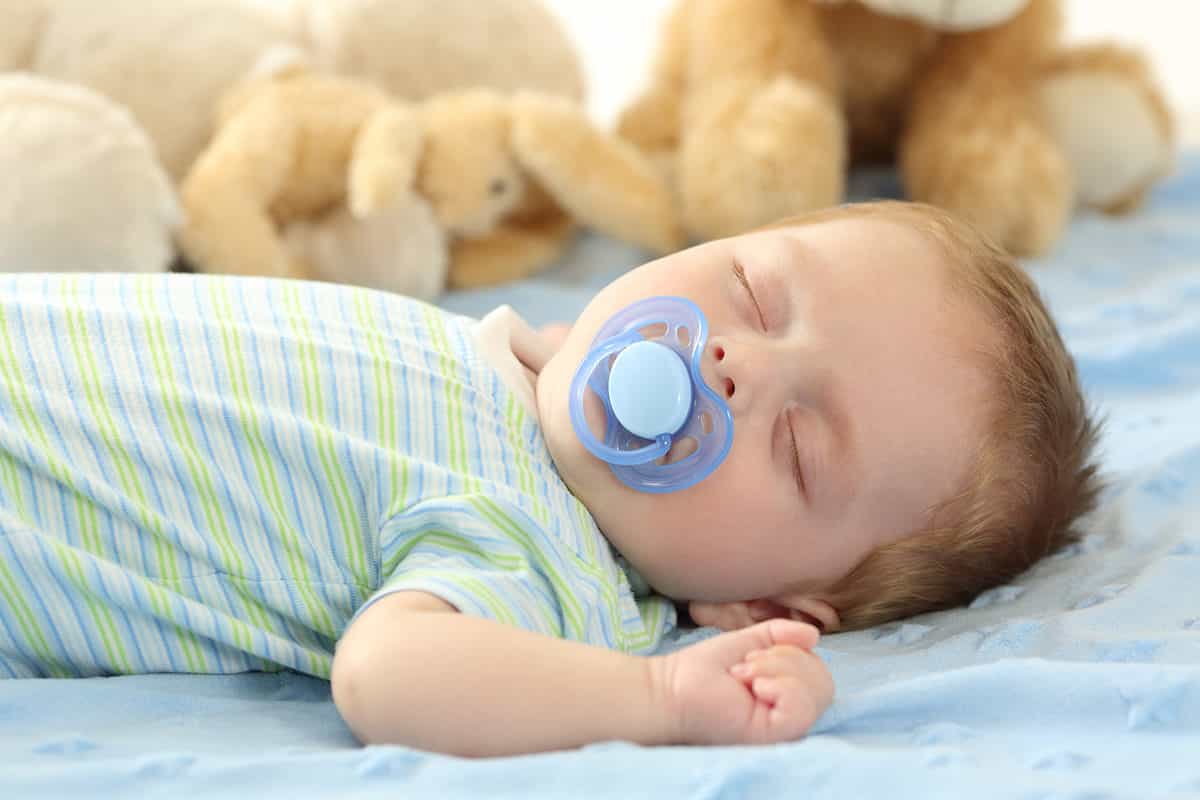
©iStock.com/AntonioGuillem
Does a Pacifier Affect Baby Weight?
Using a pacifier is a common go-to among parents and caregivers. Parents often wonder if pacifiers affect their baby's weight, particularly during the early developmental stages.
The answer depends, as research on this topic has yielded mixed results. Some studies suggest that babies who regularly use pacifiers may be more prone to weight gain. Other studies have found that pacifier use does not appear to contribute significantly to infant weight gain.
The association between pacifier use and obesity appears to be greatest among breastfed babies. This may be because breastfeeding provides superior nutrition for newborns, so if a baby is using a pacifier in addition to breast milk, they may be getting more calories than they need.
Research has also shown that babies who use a pacifier may be less likely to reach out for food when hungry and consume fewer calories, which could cause them to gain weight more slowly.
Despite the potential link between pacifier use and obesity, it is crucial to remember that no single factor can be solely responsible for a baby's weight gain or lack thereof. A balanced diet, plenty of physical activity, and healthy parenting are all essential components of proper infant nutrition.
No matter the case, it's important to do what works best for you as a parent and for the health of your baby. If what you are doing has been discussed and cleared with your specific doctor then there is little reason to worry or change what you are doing. Always consult your doctor first for any serious changes in habits or diets.
What are the Side Effects of Using a Pacifier For Too Long?
Many parents turn to a pacifier as the go-to solution when it comes to soothing a crying baby. Although pacifiers can help calm a fussy baby, there are potential side effects if used for too long. Here are the main ones;
1. Decreased speech development: Prolonged pacifier use may negatively affect a child’s ability to develop clear speech and language skills due to the position of their tongue when sucking on the pacifier.
2. Dental issues: Long-term use of pacifiers can lead to misaligned teeth, an open bite, or even an overbite.
3. Skin irritation: Continuous use of pacifiers can lead to skin irritations around the mouth and chin due to constant friction and moisture from the saliva.
4. Increase in ear infections: Due to a child’s immature immune system, prolonged pacifier use can increase their chances of developing ear infections.
5. Low self-esteem: As children grow older, they can feel embarrassed and ashamed of their pacifier use as they become more aware of social norms and behaviors. This decrease in self-confidence can lead to other issues, including low self-esteem.
Pacifier use should be limited to the first two years of a child’s life and gradually phased out as they reach age two. Parents should monitor their children’s pacifier use in quantity and length of time used to avoid any potential side effects. Not only can the over-use of a pacifier affect them in the long run, but it can also stunt your baby's ability to self-soothe in other ways down the road.
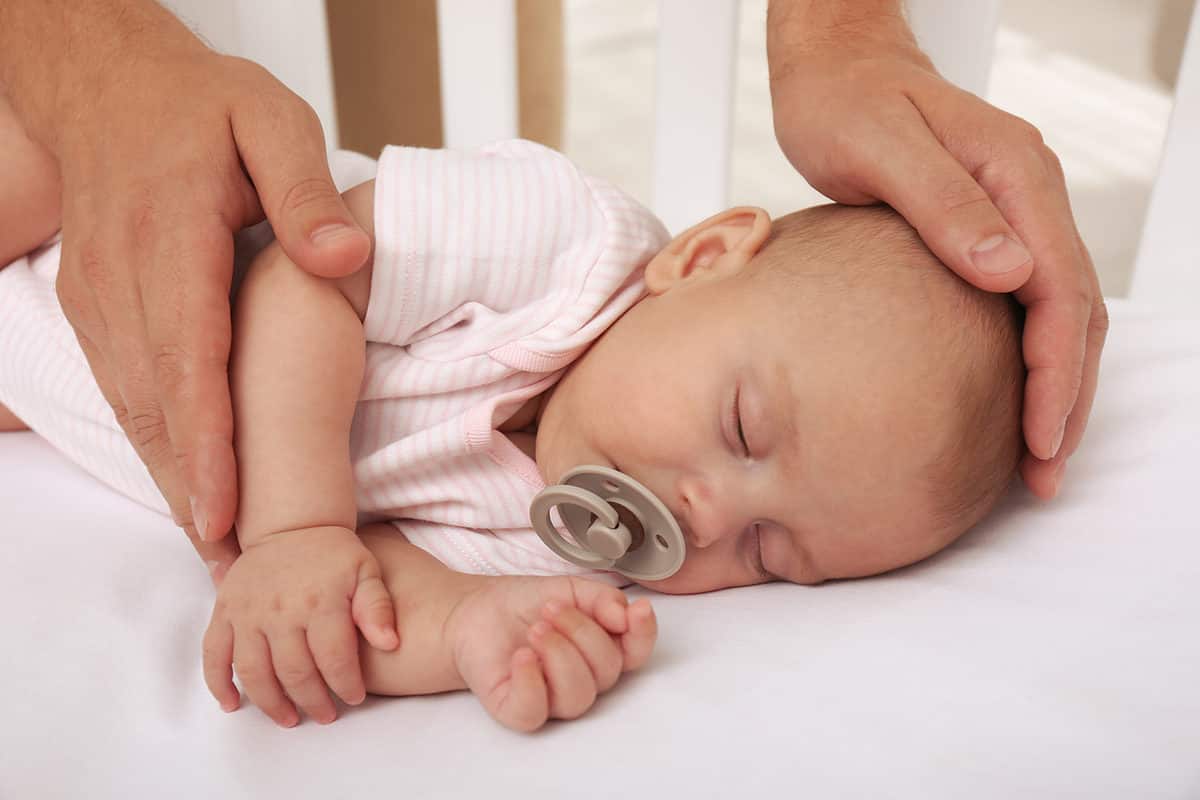
©iStock.com/Liudmila Chernetska
Conclusion
In summary, there is no definitive answer to whether or not parents should remove a pacifier when their baby is sleeping. Ultimately, it comes down to what you, as a parent, feel comfortable doing.
Some parents may choose to remove the pacifier, while others may leave it in and monitor their baby during sleep. It's important to do whatever you find to be working the best for your baby specifically.
If you choose to leave the pacifier in, there are some proven tips and tricks you can use to prevent your baby from becoming too dependent on it. Either way, ensuring your baby is safe and comfortable when sleeping is the best you can do for your baby.
The image featured at the top of this post is ©iStock.com/kckate16.
